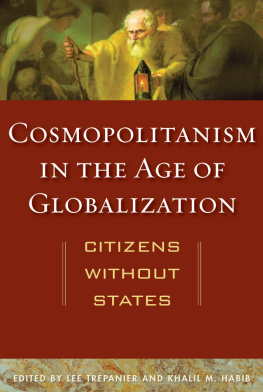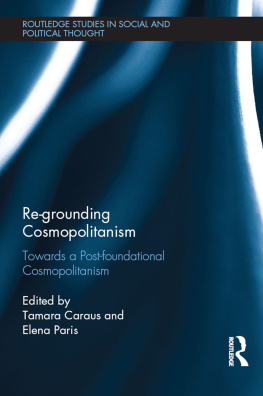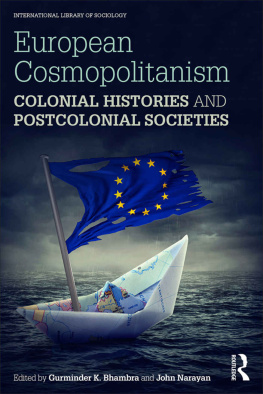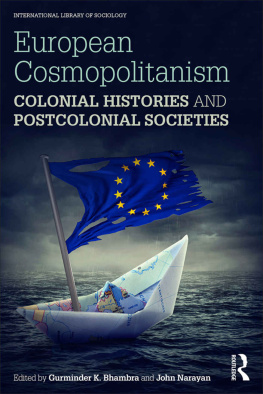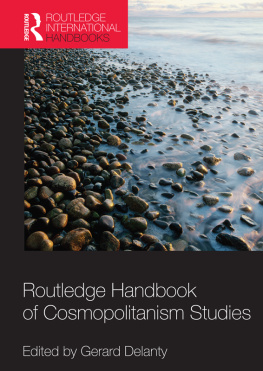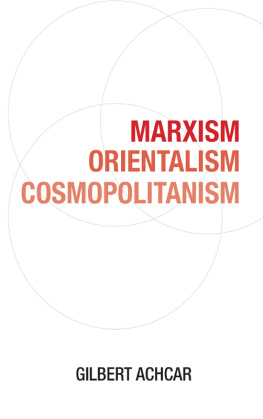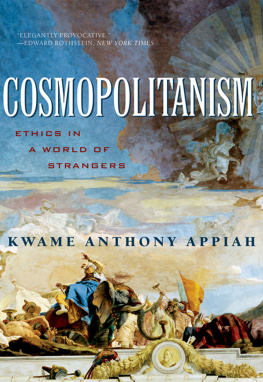Thinking Differently about Cosmopolitanism
Interventions Series: Education, Philosophy, and Culture
Edited by Michael A. Peters and Colin Lankshear
Titles Available
Subjects in Process: Diversity, Mobility, and the Politics of Subjectivity in the 21st Century
Edited by Michael A. Peters and Alicia de Alba (2012)
Toward an Imperfect Education: Facing Humanity, Rethinking Cosmopolitanism
By Sharon Todd (2009)
Democracy, Ethics, and Education: A Thin Communitarian Approach
By Mark Olssen (2007)
Beyond Learning: Democratic Education for a Human Future
By Gert J. J. Biesta (2006)
Education, Globalization, and the State in the Age of Terrorism
Edited by Michael A. Peters (2005)
Thinking Differently about Cosmopolitanism
Theory, Eccentricity, and the Globalized World
Marianna Papastephanou
First published 2012 by Paradigm Publishers
Published 2016 by Routledge
2 Park Square, Milton Park, Abingdon, Oxon OX14 4RN
711 Third Avenue, New York, NY 10017, USA
Routledge is an imprint of the Taylor & Francis Group, an informa business
Copyright 2012, Taylor & Francis.
All rights reserved. No part of this book may be reprinted or reproduced or utilised in any form or by any electronic, mechanical, or other means, now known or hereafter invented, including photocopying and recording, or in any information storage or retrieval system, without permission in writing from the publishers.
Notice:
Product or corporate names may be trademarks or registered trademarks, and are used only for identification and explanation without intent to infringe.
Library of Congress Cataloging-in-Publication Data
Papastephanou, Marianna.
Thinking differently about cosmopolitanism : theory, eccentricity, and the globalized world / Marianna Papastephanou.
p. cm. -- (Interventions: education, philosophy & culture)
Includes bibliographical references.
ISBN 978-1-61205-079-9 (hc. : alk. paper)
1. Cosmopolitanism. 2. Globalization--Political aspects. I. Title.
JZ1308.P365 2012
303.482--dc23
2012004641
ISBN 13 : 978-1-61205-079-9 (hbk)
ISBN 13 : 978-1-61205-080-5 (pbk)
Contents
Let me thank here my friends outside academia for inspiring and encouraging me throughout the years. I am no less indebted to local and international academics (in particular, Anna Kouppanou, Maria Pa-paioannou, and Olga Papastamou) and to my students, my colleagues, and my friends in the Department of Education (among them, the new head of the department, Professor Mary Ioannides-Koutselini, as well as Charoula Angeli-Valanides, Nicos Valanides, Maria Heliophotou-Menon, Zelia Gregoriou, Stavros Photiou, and Miranda Christou). I give special thanks to Michael Peters, who suggested that I write a book on cosmopolitanism about two years ago. I am grateful to him not only for providing the initial impetus but also for his overall support in making this idea a reality. Likewise, many thanks to Paradigm Publishers for agreeing to publish the book and for all the work done on their part (and many thanks to Jason Barry, associate acquisitions editor of Paradigm Publishers, for his guidance and encouragement).
I am grateful to Professors Richard Smith, Paul Standish, Marius Felderhof, Bharath Sriraman, Ronald Sultana, Michalinos Zembylas, Tyson E. Lewis, Claudia Ruitenberg, David Bridges, Chris Winch, David Hansen, Stephanie Burdick-Shepherd, Cristina Cammarano, Marios Constantinou, Nick Burbules, Victor Roudometof, Simone Galea, Duncan Mercieca, Carmel Borg, Paul Gibbs, Mark Murphy, Ted Fleming, James Mensch, Alan Reid, Ian Davies, A. Britton, and H. Blee for offering me opportunities to contribute either to conferences or to collections of essays and thus to receive valuable responses to, and constructive criticism of, my ideas.
I express my gratitude especially to Professors Christopher Norris, Karl-Otto Apel, Klas Roth, Leonard Waks, Alison Iredale, Lynn Fendler, Ilan Gur-Zeev, and Heinz-Uwe Haus for their friendship, their valuable comments, and our regular e-mail exchanges on several issues related to philosophy, art, and philosophy of education.
Terry McLaughlins support during the early phase of my work in philosophy of education is always remembered with gratitude. The memory of his personality and friendship is as vivid as ever.
Many thanks also to the following journals for giving my arguments a first airing in their pages and for permitting me to employ some of those arguments in an expanded or revised version in this book: Journal of Philosophy of Education (for the articles Arrows Not Yet Fired: Cultivating Cosmopolitanism through Education and The Cosmopolitan Self Does Her Homework); Educational Philosophy and Theory (for the articles Globalization, Globalism and Cosmopolitanism as an Educational Ideal and Walls and Laws: Proximity, Distance and the Doubleness of the Border); History of the Human Sciences (for the article Kants Cosmopolitanism and Human History); Educational Theory (for the article Material Spectres: International Conflict, Disaster Management and Educational Projects); Ethics and Education (for the article Hesiod the Cosmopolitan: Utopian and Dystopian Discourse and Ethico-Political Education); and Journal of Social Science Education (for the article A New Vision of Europe: Infectious or Infected? The Position of Education).
I owe a huge debt to my family, whose loving and caring support cannot be overestimated. In mentioning my family, many tender thoughts come to mind about my grandfather, Panayotis, who spent most of his life sailing in local and foreign seas. His narrations of his journeys and of his childhood on his island in times that seem so distant and different from the present were always a source of excitement and wonder for me. He recounted these stories in the most engaging way, even until his peaceful death last December. I dedicate this book to his memory.
T HE BOOK ARGUES THAT A NEW CONCEPTION OF COSMOPOLITANISM is needed and addresses this need by formulating a conception of cosmopolitanism as an eccentric ethico-political ideal. Such cosmopolitanism is eccentric in the sense that it decenters the self, cultivates centrifugal virtues, and questions the inflated concern for the globally enriched self. It does so for the sake of an as yet deflated concern for strong ethico-political demands that otherness makes upon the self. The demands in question will be presented in the book as higher than the currently fashionable ones of tolerance, respect, charity, duty, and moral/legal obligation.
The why of discussing cosmopolitanism in fresh semantic-conceptual terms emerges through the following rationale: (1) the academic currency of diverse but often incompatible meanings of cosmopolitanism causes unease to many academics and students and creates the impression that cosmopolitanism is elastic enough to mean just about anything related to globality; (2) the reluctance to discuss some of those meanings frequently leads to uncritical dissemination of fashionable though facile and even undesirable conceptions of cosmopolitanism; (3) the overreliance on the modern understanding of cosmopolitanism and failure conceptually to go beyond it reintroduce pathologies (e.g., toxic universalism, Eurocentrism, developmentalism) that have been associated with modernityor do not hold them sufficiently in check; and (4) the failure to handle conceptual requirements adequately consolidates and reproduces problems of needless internal contradiction or needless preoccupation with false dilemmas. Many approaches that omit conceptual work fall, precisely due to this omission, into the trap of contradictory uses of cosmopolitanism, for they employ it both as a negatively and as a positively meant concept often even within the very same text. And other approaches fail to navigate through drastic choices and unproductive tensions between cosmopolitanism and patriotism, among other things, because they lack the conceptual means for transcending terminological accounts that typically entail such dichotomous thinking.






